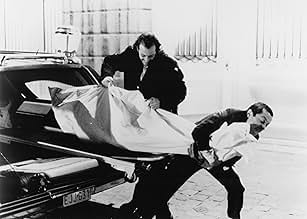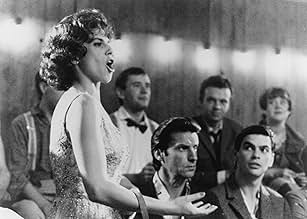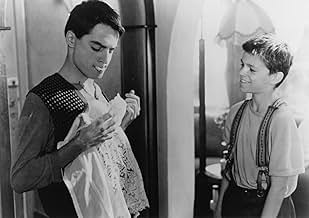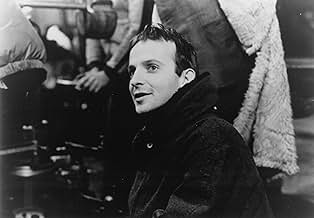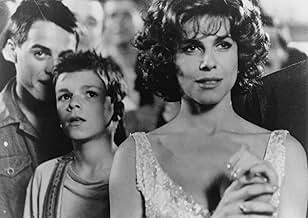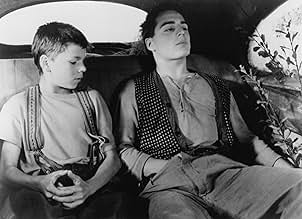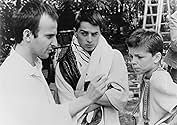NOTE IMDb
6,7/10
1,6 k
MA NOTE
Ajouter une intrigue dans votre langueHarry Voss' life spans three pivotal days: his carefree youth, high school graduation, and lonely middle age, exploring life's fleeting moments and unfulfilled dreams.Harry Voss' life spans three pivotal days: his carefree youth, high school graduation, and lonely middle age, exploring life's fleeting moments and unfulfilled dreams.Harry Voss' life spans three pivotal days: his carefree youth, high school graduation, and lonely middle age, exploring life's fleeting moments and unfulfilled dreams.
- Réalisation
- Scénario
- Casting principal
- Récompenses
- 7 victoires au total
Stanley Duchateau
- Théo
- (as Stan Duchateau)
- …
Avis à la une
Loosely based on the writings of Charles Bukowski,the first segment is actually based on a couple of paragraphs from a short story by John Fante,Bukowski's favorite writer. Director Dominique Deruddere has let his imagination run wild,so what the audience ends up with is a vision of Bukowski living John Fante's childhood, in the European countryside.Gene Bervoets looks very much like Buk's description of himself in "Ham on Rye" and other writings.The soundtrack is great.An interesting coming of age tale.
LOVE IS A DOG FROM HELL (a.k.a CRAZY LOVE) (Dominique Deruddere - Belgium 1987).
Three Bukowskian tales set in a Belgian, mostly rural, setting. How about that? Despite good reviews upon its release, winning several awards and getting support by Hollywood heavyweights Sean Penn and Francis For Coppola, the film vanished into obscurity almost immediately after its release. Perhaps it was bad timing, because Barbet Schroeder's star-studded BARFLY was released almost simultaneously. Who knows? By any chance, this film is a beauty, clearly deserving wider attention.
The film has a three-act construction, all set around the live of Harry Voss, focusing on his difficult search for love and affection. The first act is set in 1955 and follows Harry when he's twelve years old. He is struck by his first notions of true love when he sees a dream-like film in cinema, only to be helped out of his dream by a more mature friend who claims the only reason people get married is to get laid. Remember, it's fifties' rural Flanders we're talking here. In the second act, in the early sixties, Harry is a shy 19-year old, his face horribly disfigured by a grotesque form of acne. When driving in the bus, he is stared at by all the children, while the adults look away. There's a high school dance, but Harry can't get a girl. In the third act we get a more literal adaptation of Bukowsky's THE COPULATING MERMAID OF VENICE, CA., when Harry is a down-on-his-luck alcoholic, devoid of any aspirations, spending most of his time in shady bars. When he meets an old acquaintance, they go on a joined drinking binch and rehash old memories while patrolling the foggy streets. In their drunken frenzy ("for old time's sake") they decide to steal a body from an ambulance they see on a deserted street and take it to an abandoned house. This makes - how morbid it may sound - for one of the most beautiful and touching scenes of the film. The ending is a beauty.
In the first act the film starts of a bit slowly with some awkward moments. I found the second and third acts the strongest, but all three segments show remarkable cinematic harmony. Beginning and ending the film with nicely contrasted mirror images of "the Princess" running across some dimly lit corridor and Raymond van het Groenewoud's haunting musical theme, it makes for a very neat composition indeed. Cars also feature prominently in all three segments. Most of the key scenes take place in or around cars. It all a very American feel to it, especially the second act. A homecoming dance, a prom, lampoons, American cars, it's small town USA transferred to Belgium. The lead performance by Josse de Pauw who plays the adult Harry in the second and third acts, is a joy to watch.
All the more recommended, because of Mondo Macabro's excellent DVD-release. A bit of an oddity in their usual catalogue of all kinds of exploitational sewers of world cinema (which I often like, don't get me wrong), their treatment of the film is excellent, with a luminous new transfer and jam-packed with extras. Two documentaries, the "making-off" with some great footage of Bukowski and his thoughts on the film, a filmed interview with director Deruddere, a text essay on Flemish cinema, and Mondo Macabro's usual trailer reel of the wilder side of world cinema to top it all off. With an almost surrealist setting and touching subjects like necrophilia, it's not a film most audiences will embrace easily, but any fan of Bukowski, Belgian cinema or good cinema in general should really give this one a try. It might be a far cry from Bukowsky's usual settings but liberal interpretations usually make for far more interesting films. This is worth seeing. Damn, the man even approved of it himself!
Camera Obscura --- 9/10
Three Bukowskian tales set in a Belgian, mostly rural, setting. How about that? Despite good reviews upon its release, winning several awards and getting support by Hollywood heavyweights Sean Penn and Francis For Coppola, the film vanished into obscurity almost immediately after its release. Perhaps it was bad timing, because Barbet Schroeder's star-studded BARFLY was released almost simultaneously. Who knows? By any chance, this film is a beauty, clearly deserving wider attention.
The film has a three-act construction, all set around the live of Harry Voss, focusing on his difficult search for love and affection. The first act is set in 1955 and follows Harry when he's twelve years old. He is struck by his first notions of true love when he sees a dream-like film in cinema, only to be helped out of his dream by a more mature friend who claims the only reason people get married is to get laid. Remember, it's fifties' rural Flanders we're talking here. In the second act, in the early sixties, Harry is a shy 19-year old, his face horribly disfigured by a grotesque form of acne. When driving in the bus, he is stared at by all the children, while the adults look away. There's a high school dance, but Harry can't get a girl. In the third act we get a more literal adaptation of Bukowsky's THE COPULATING MERMAID OF VENICE, CA., when Harry is a down-on-his-luck alcoholic, devoid of any aspirations, spending most of his time in shady bars. When he meets an old acquaintance, they go on a joined drinking binch and rehash old memories while patrolling the foggy streets. In their drunken frenzy ("for old time's sake") they decide to steal a body from an ambulance they see on a deserted street and take it to an abandoned house. This makes - how morbid it may sound - for one of the most beautiful and touching scenes of the film. The ending is a beauty.
In the first act the film starts of a bit slowly with some awkward moments. I found the second and third acts the strongest, but all three segments show remarkable cinematic harmony. Beginning and ending the film with nicely contrasted mirror images of "the Princess" running across some dimly lit corridor and Raymond van het Groenewoud's haunting musical theme, it makes for a very neat composition indeed. Cars also feature prominently in all three segments. Most of the key scenes take place in or around cars. It all a very American feel to it, especially the second act. A homecoming dance, a prom, lampoons, American cars, it's small town USA transferred to Belgium. The lead performance by Josse de Pauw who plays the adult Harry in the second and third acts, is a joy to watch.
All the more recommended, because of Mondo Macabro's excellent DVD-release. A bit of an oddity in their usual catalogue of all kinds of exploitational sewers of world cinema (which I often like, don't get me wrong), their treatment of the film is excellent, with a luminous new transfer and jam-packed with extras. Two documentaries, the "making-off" with some great footage of Bukowski and his thoughts on the film, a filmed interview with director Deruddere, a text essay on Flemish cinema, and Mondo Macabro's usual trailer reel of the wilder side of world cinema to top it all off. With an almost surrealist setting and touching subjects like necrophilia, it's not a film most audiences will embrace easily, but any fan of Bukowski, Belgian cinema or good cinema in general should really give this one a try. It might be a far cry from Bukowsky's usual settings but liberal interpretations usually make for far more interesting films. This is worth seeing. Damn, the man even approved of it himself!
Camera Obscura --- 9/10
CRAZY LOVE (Love Is A Dog From Hell) is a romantically disquieting and dismaying film by Flemish director,Dominique Deruddere, and is loosely based on Charles Bukowski's short story, "The Copulating Mermaid From Venice, California". Bukowski is often referred to as, "The Poet Laueate of Skid Row", and all of his work embraces the darker aspects of reality, and this film is certainly no exception. CRAZY LOVE is divided into three parts, and examines the life of the deeply flawed and conflicted individual, Harry Voss. In the first section, we witness Harry at the age of twelve as he begins to intuit the romantic possibilities of Love, and is introduced to the sordid mechanics of sex. And, in the second section, he is a senior in high school who tries to establish some kind of a romantic relationship with the opposite sex while dealing with a disfiguring case of acne. And, in the final section, Harry directly confronts the most perfect manifestation of his sexual and romantic desires. The film is a minor classic of Flemish cinema, and the Netlix disc contains an excellent Bonus Selection which offers an insightful conversation with the director, a short feature on the making of the film, and a brief description of the history of Belgium film-making. CRAZY LOVE is certainly not for everyone, but Bukowski has said that this film comes the closest to capturing the essence of his work.
A very nice debut by Flamish director in which he exposuse the works of writer Bukowski to the film world.
In the first part you see young harry being exposed to young male fantasies, which most guys of his age would not dare to do. You would say highly unlikely...but yet we all fantasies the same way.
The second part is set in his high school years. Harry now a student with the worlds' biggest acne problem. Really no joke, I myself had acne, but this guy... The acne was onpurposely over reacted, to give a real stamp on how hell teenage life can be(especially when you have acne, it really ruines your youth/life).
The third part shows a real black page out of the life of Harry. He know is a heavy alcoholic who meets an old friend, both get drunk and decide to....well for that you can better watch the film.
A very nice film with some great funny parts in the different timeperiodes. Very poetic, nice rock 'n roll music in the background (typical Belgium). Only sometimes the camerawork is really bad (intro at the cinema with the princess), but thats only a few (minor disadvantages) times. (Opposite)Check out the great camerawork at the end of part 1 (the face of harry) and the beginning of part 2, starting from the radio.
Enjoy
In the first part you see young harry being exposed to young male fantasies, which most guys of his age would not dare to do. You would say highly unlikely...but yet we all fantasies the same way.
The second part is set in his high school years. Harry now a student with the worlds' biggest acne problem. Really no joke, I myself had acne, but this guy... The acne was onpurposely over reacted, to give a real stamp on how hell teenage life can be(especially when you have acne, it really ruines your youth/life).
The third part shows a real black page out of the life of Harry. He know is a heavy alcoholic who meets an old friend, both get drunk and decide to....well for that you can better watch the film.
A very nice film with some great funny parts in the different timeperiodes. Very poetic, nice rock 'n roll music in the background (typical Belgium). Only sometimes the camerawork is really bad (intro at the cinema with the princess), but thats only a few (minor disadvantages) times. (Opposite)Check out the great camerawork at the end of part 1 (the face of harry) and the beginning of part 2, starting from the radio.
Enjoy
Rather effective three part tribute to Charles Bukowsi ( even if the first part is based on the semi autobiographical tale by his author of choice, Joe Fante). The middle section is more predictable than the others and all fairly shocking. The movie mixes music and tempos as well as mood to give just the right bitter sweet flavour with more than a hint of romanticism and drunkenness to give this the authentic air. The attempted initiation of the young boy, the acute acne humiliations and the necrophilia are all hard to take but the film is dressed well enough and a smile lingers despite it all. It also has to be said that the director has managed to convey a real sense of Bukowski's writings/life and that is no small feat in itself.
Le saviez-vous
- AnecdotesRegarded by Charles Bukowski as the most successful effort to bring his work to the screen.
- ConnexionsReferenced in Film Junk Podcast: Episode 548: Making a Murderer (2016)
Meilleurs choix
Connectez-vous pour évaluer et suivre la liste de favoris afin de recevoir des recommandations personnalisées
- How long is Crazy Love?Alimenté par Alexa
Détails
Box-office
- Montant brut aux États-Unis et au Canada
- 119 919 $US
Contribuer à cette page
Suggérer une modification ou ajouter du contenu manquant

Lacune principale
What is the Spanish language plot outline for L'amour est un chien de l'enfer (1987)?
Répondre

